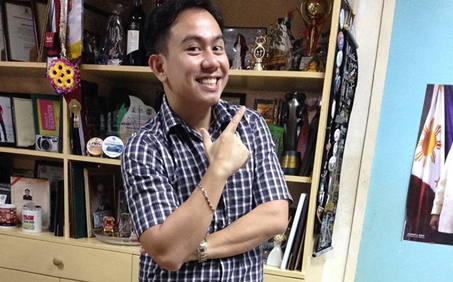By MARIAH NICOLE SANTUICO
 WHILE children his age were busy watching television, this 7-year-old would instead be tuned into the radio.
WHILE children his age were busy watching television, this 7-year-old would instead be tuned into the radio.
There was no TV set in his home in Bataan. So he killed time listening intently to the range of voices, especially of radio news broadcasters and drama talents, coming out of the small box. When he felt he had heard enough, he would do something that would make him extraordinary.
He successfully imitated the voices.
Today, at 34, Pocholo Gonzales is acknowledged as the “Voice Master.”
He is the voice of more than a hundred characters that have become familiar to radio, television, movie, computer game and anime aficionados: Cha cha in “Bubu Cha Cha,” Kuro Chan in “Cyborg Kuro Chan” and Shan Cai’s father in “Meteor Garden.”
But Gonzales has gone beyond voicing and dubbing characters. In 2005, he formed CreatiVoices Productions, the only Philippine-based online voice-over company, and began teaching Filipinos the art of acting with their voice.
“Voice acting for me is not a work or a career; it’s my craft,” Gonzales said. “It’s my Mona Lisa. It’s my masterpiece.”
Not that success came easy.
Gonzales joined the voice acting industry when he was 16 after winning a voice acting competition of a radio station. But he would soon discover that the industry was unfriendly and mafia-driven.
“They don’t want newbies. They don’t want new people. They don’t want new voices,” he said.
He resigned three times in various companies as a voice artist, but he was undeterred and even expanded from radio to other mediums.
Changing one’s voice is complicated, and it will take years to explain everything about it, Gonzales said.
Fortunately for beginners, including students of CreatiVoices, they learn the three basic techniques in changing one’s voice. One, changing the pitch. Two, changing the pitch’s character or making the voice huskier or thinner. Three, changing the tempo.
But the main key to changing one’s voice is to identify with the character. “Be the character, and your voice will change automatically,” Gonzales said.
Gonzales considers all the characters he has dubbed his favorites because, he said, he put his heart in every one of them. He identified with each character and became the character, including those in anime, of which he has really never been a fan.
CreatiVoices is Gonzales’ way of helping create a better future for fellow voice artists.
He holds voice acting and dubbing workshops with a single-mindedness to make artists out of his students. “There are dubbers and there are voice artists,” Gonzales said.
Voice acting, he said, is not about the money but about passion. And when your voice is heard by thousands of people, someone would remember and recognize you, he added.
Because voice actors are heard, not seen, Gonzales lamented that voice acting is among the most unrecognized crafts. It also saddens him that Filipinos mostly dub the work of foreigners when they could have been the best producers and content creators in the animation industry.
So Gonzales has turned himself into a motivational speaker as well, drawing inspiration from national hero Jose Rizal.
Like Rizal, Gonzales said he wants to motivate the youth the most because he believes they are talented but cannot express themselves freely. One of his goals is to create a venue for them where they can express their thoughts and opinions.
In his talks, the Voice Master likes to cite his own experience to show his audience how to overcome adversity. “I am a fan of my own story because I came from nothing,” he said.
Given his family’s tight finances, studying abroad to hone his craft even after Gonzales discovered his talent was out of the question. So he studied voice acting on his own until he got the chance to learn more about it in U.S. 11 years ago. He received the Youth Action Net Award sponsored by the International Youth Foundation and Youth in Action Award by the Global Youth Action Network in U.S.
Again, Rizal was Gonzales’ inspiration. “He saw the world without money. He just had the passion,” he said.
Knowing his voice is one of his biggest assets, the Voice Master takes extreme care of it. He does not strain or abuse his voice. He gargles with warm water and salt every morning.
But he knows full well that the time would come when his voice would get weaker and might just be gone one day.
That doesn’t worry him too much. By then, he said, he would have created many other voice artists. “So they can be my voice, and they are already my voices, so I can claim I have thousands of voices,” Gonzales said.
In the end, what matters most is the person has lived the life he or she really wanted. “Do what you love and love what you do—and you will die happy,” said the Voice Master.
(The writer is a Film student at the University of the Philippines-Diliman who submitted this story to her Journ 101—Introduction to Journalism—class under VERA Files trustee Yvonne T. Chua.)
